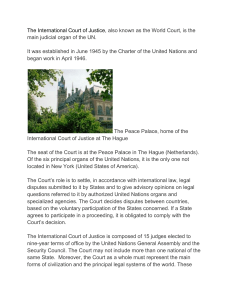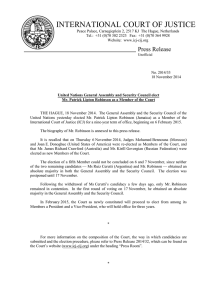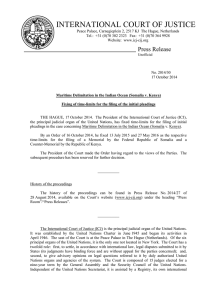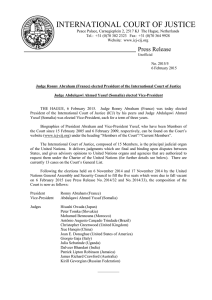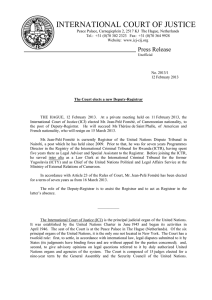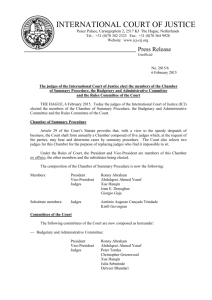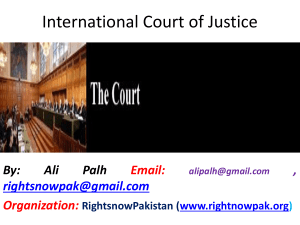INTERNATIONAL COURT OF JUSTICE
advertisement
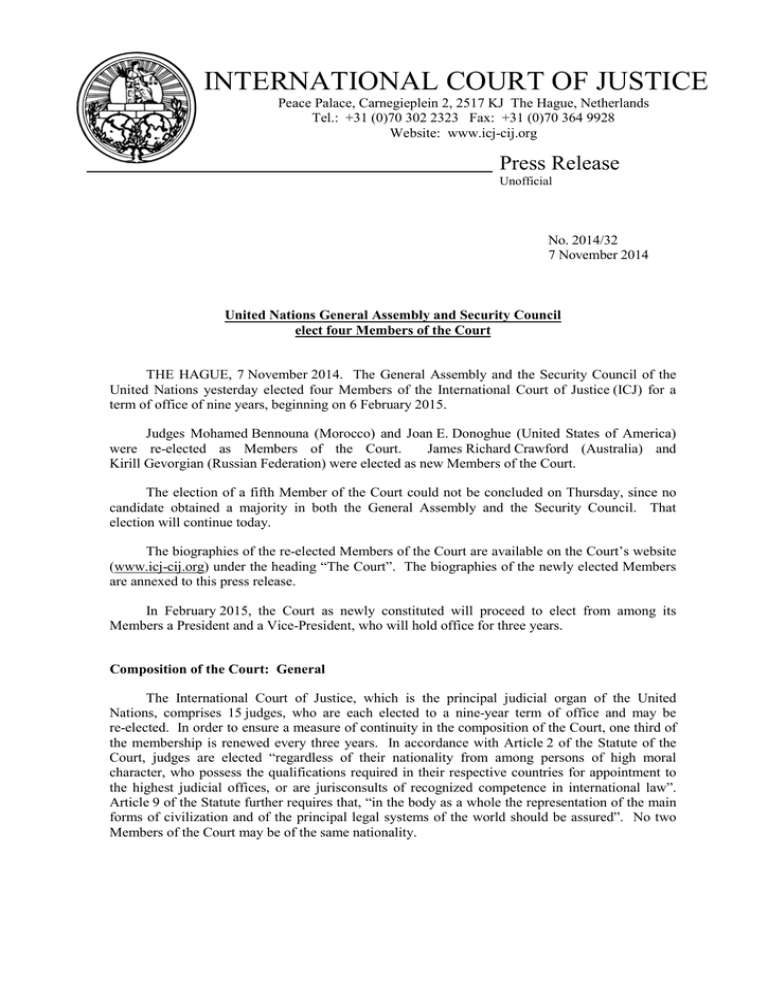
INTERNATIONAL COURT OF JUSTICE Peace Palace, Carnegieplein 2, 2517 KJ The Hague, Netherlands Tel.: +31 (0)70 302 2323 Fax: +31 (0)70 364 9928 Website: www.icj-cij.org Press Release Unofficial No. 2014/32 7 November 2014 United Nations General Assembly and Security Council elect four Members of the Court THE HAGUE, 7 November 2014. The General Assembly and the Security Council of the United Nations yesterday elected four Members of the International Court of Justice (ICJ) for a term of office of nine years, beginning on 6 February 2015. Judges Mohamed Bennouna (Morocco) and Joan E. Donoghue (United States of America) were re-elected as Members of the Court. James Richard Crawford (Australia) and Kirill Gevorgian (Russian Federation) were elected as new Members of the Court. The election of a fifth Member of the Court could not be concluded on Thursday, since no candidate obtained a majority in both the General Assembly and the Security Council. That election will continue today. The biographies of the re-elected Members of the Court are available on the Court’s website (www.icj-cij.org) under the heading “The Court”. The biographies of the newly elected Members are annexed to this press release. In February 2015, the Court as newly constituted will proceed to elect from among its Members a President and a Vice-President, who will hold office for three years. Composition of the Court: General The International Court of Justice, which is the principal judicial organ of the United Nations, comprises 15 judges, who are each elected to a nine-year term of office and may be re-elected. In order to ensure a measure of continuity in the composition of the Court, one third of the membership is renewed every three years. In accordance with Article 2 of the Statute of the Court, judges are elected “regardless of their nationality from among persons of high moral character, who possess the qualifications required in their respective countries for appointment to the highest judicial offices, or are jurisconsults of recognized competence in international law”. Article 9 of the Statute further requires that, “in the body as a whole the representation of the main forms of civilization and of the principal legal systems of the world should be assured”. No two Members of the Court may be of the same nationality. -2Submission of candidacies All States parties to the Statute of the Court (currently 193) have the right to propose candidates. However, candidates are not nominated directly by governments but by the national groups in the Permanent Court of Arbitration (PCA) or, in the case of States not participating in the PCA, by similarly constituted national groups. The Permanent Court of Arbitration, which is based in The Hague, was established under the Hague Conventions of 1899 and 1907. Each State party to those Conventions (currently 116) has its own national group, that is to say, a group of up to four jurists who can be called upon to serve as members of an arbitral tribunal under the Conventions. When an election takes place to fill vacancies at the International Court of Justice, each national group can propose up to four candidates, not more than two of whom may be of its own nationality. The others may be from any other country. The names of candidates must be communicated to the Secretary-General of the United Nations. Election procedure Members of the Court are elected by the General Assembly and by the Security Council. These organs vote at the same time but independently of one another. This procedure is intended to ensure, as far as possible, that the vote in one organ does not influence the vote in the other. In order to be elected, a candidate must receive an absolute majority of the votes in both organs, that is to say, currently 97 votes in the General Assembly and eight votes in the Security Council, where no right of veto applies for the purpose of the election and no distinction is made between the votes of the permanent and non-permanent members of the Council. * Photographs of the elections taken at the General Assembly and in the Security Council are available on the United Nations website at the following address: www.unmultimedia.org/photo. ___________ The International Court of Justice (ICJ) is the principal judicial organ of the United Nations. It was established by the United Nations Charter in June 1945 and began its activities in April 1946. The seat of the Court is at the Peace Palace in The Hague (Netherlands). Of the six principal organs of the United Nations, it is the only one not located in New York. The Court has a twofold role: first, to settle, in accordance with international law, legal disputes submitted to it by States (its judgments have binding force and are without appeal for the parties concerned); and, second, to give advisory opinions on legal questions referred to it by duly authorized United Nations organs and agencies of the system. The Court is composed of 15 judges elected for a nine-year term by the General Assembly and the Security Council of the United Nations. Independent of the United Nations Secretariat, it is assisted by a Registry, its own international secretariat, whose activities are both judicial and diplomatic, as well as administrative. The official languages of the Court are French and English. Also known as the “World Court”, it is the only court of a universal character with general jurisdiction. The ICJ, a court open only to States for contentious proceedings, and to certain organs and institutions of the United Nations system for advisory proceedings, should not be confused with the other mostly criminal judicial institutions based in The Hague and adjacent areas, such as the International Criminal Tribunal for the former Yugoslavia (ICTY, an ad hoc court created by the -3Security Council), the International Criminal Court (ICC, the first permanent international criminal court, established by treaty, which does not belong to the United Nations system), the Special Tribunal for Lebanon (STL, an independent judicial body composed of Lebanese and international judges, which is not a United Nations tribunal and does not form part of the Lebanese judicial system), or the Permanent Court of Arbitration (PCA, an independent institution which assists in the establishment of arbitral tribunals and facilitates their work, in accordance with the Hague Convention of 1899). ___________ Information Department: Mr. Andrey Poskakukhin, First Secretary of the Court, Head of Department (+31 (0)70 302 2336) Mr. Boris Heim, Information Officer (+31 (0)70 302 2337) Ms Joanne Moore, Associate Information Officer (+31 (0)70 302 2394) Ms Genoveva Madurga, Administrative Assistant (+31 (0)70 302 2396) -1- Annex to Press Communiqué 2014/32 Curriculum vitae as published by the UN Secretariat in document A/69/254-S/2014/522 -2- -3- -4- -5- -6- -7- -8- -9- - 10 - - 11 - - 12 - - 13 - - 14 - - 15 - - 16 - - 17 -
